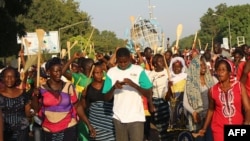Police fired teargas at rock-throwing protesters after tens of thousands marched through Burkina Faso's capital on Tuesday calling for President Blaise Compaore to scrap plans to change term limits to stay in power.
An early morning march through the heart of Ouagadougou was peaceful but clashes erupted later as protesters tried to advance towards the National Assembly.
Tuesday marked the start of a civil disobedience campaign by opposition parties after the government asked the National Assembly to order a referendum on changing the constitution to let Compaore seek re-election next year rather than step down.
Former colonial power France, which uses Burkina Faso as a base for Special Forces soldiers operating across West Africa, urged Compaore to abide by an African Union charter stipulating that leaders should not change the law to try to stay in power.
“The people have decided to start a general popular resistance. The first grievance is to get the withdrawal, pure and simple, of this legal project,” Zephirin Diabre, head of the opposition delegation, told the crowd of demonstrators.
Protesters chanted “Step aside!” and “Don't touch Article 37,” referring to the clause in the constitution that now bars Compaore, in power for 27 years, from running again next year.
Others carried banners comparing Compaore to Ebola, the virus that has killed nearly 5,000 people in the nearby states of Liberia, Guinea and Sierra Leone.
“We must disinfect ourselves,” one read.
There was no immediate figure for arrests or casualties. A government spokesman was not immediately available for comment.
Protesters who marched towards the National Assembly, where the law will be debated on Thursday, were blocked by security forces who fired volleys of teargas and used water cannons.
They responded by burning tires and throwing rocks. A pocket of demonstrators gathered in a downtown square pledging to hold out until Compaore shelved his plan.
“It's provocation. They [the authorities] want to set the country on fire,” said a young protester. “Even if Blaise Compaore burns the country down, he will depart all the same.”
Demonstrators in Bobo Dioulasso, Burkina Faso's second biggest town, 330 km (205 miles) to the southwest of the capital, pulled down a statue of Compaore, a witness said.
They left intact an adjacent statue of Libya's late leader Moammer Gadhafi, who was a popular figure in some poor African countries because of his generous cash donations.
AU rules
The French government on Tuesday said it expected Compaore to adhere to laws drawn up by his peers.
“The African Union charter on democracy and good governance article 23... specifies clearly that constitutional revisions aiming to prevent political change are banned,” Foreign Ministry spokesman Romain Nadal told reporters.
Nadal said breaking the charter could lead to sanctions. President Francois Hollande had sent a letter to Compaore on Oct. 7 outlining this position, he added.
French troops based in Ouagadougou are a key part of French counter-terrorism operations across West Africa.
Compaore has positioned himself as a key mediator in regional conflicts and is also an important ally of the United States the regional fight against al-Qaida-linked Islamists.
Having seized power in a 1987 coup, Compaore has won a series of elections, the last of which was in 2010.
However, he faced unprecedented protests in 2011 from a usually loyal army. The referendum plan has split his nation, one of the world's poorest despite being a top regional cotton producer and home to a fledgling gold industry.
